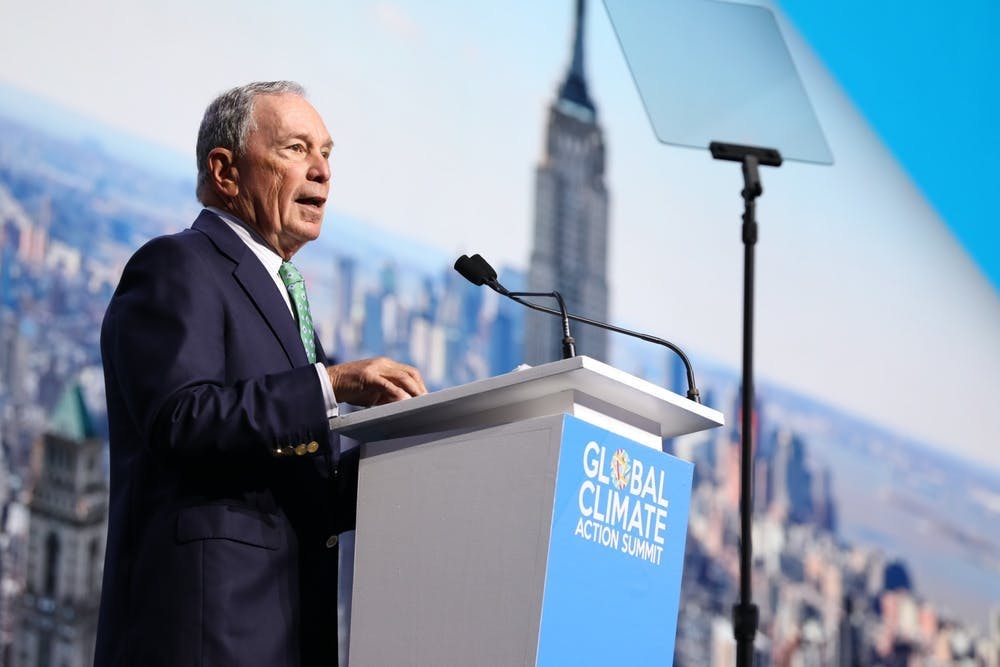Hopkins alum and former New York City Mayor Michael Bloomberg ended his campaign for president, endorsing former Vice President Joe Biden, on Wednesday morning. This announcement came after Bloomberg won only 53 delegates — and one territory — on Super Tuesday, despite spending hundreds of millions on his campaign.
In 2018, Bloomberg donated a record $1.8 billion to the University — the largest private donation ever made to a college. The donation allowed Hopkins to become a loan-free and permanently need-blind university.
Before entering politics, Bloomberg was a successful businessman. He made his fortune co-founding Bloomberg L.P. in 1981, a global financial services and mass media company. He is currently the CEO and majority owner of the corporation.
Mikhael Hammer-Bleich, former president of the College Democrats (HopDems), expressed disappointment in Bloomberg’s decision.
“It would be a lie to say that it isn’t a sad day for Hopkins,” he said. “Having an [alum] be the Democratic nominee, be the president or having a chance of that happening would be very positive for the University.”
Senior Colin Bowen, however, disagreed.
“I’m happy that Bloomberg dropped out before Ronald Daniels could endorse him, so I wouldn’t have another reason to be disappointed in this school,” he said.
By contrast, Ryan Ebrahimy, co-president of HopDems and founder of Hopkins Students for Bernie Sanders, stated that he did not think that Bloomberg’s decision to leave the race would have a large impact on campus opinion about the Democratic primaries.
“Despite Bloomberg’s $1.8 billion donation for undergraduate financial aid, I think a lot of students were able to see through this gesture and assess Bloomberg’s troubling history for what it was, so his departure from the primaries wouldn’t have a significant effect among students,” he said.
Ebrahimy voiced concerns about Bloomberg leaving the race.
“I’m not surprised by Bloomberg dropping out but am concerned that him doing so — alongside his endorsement of Biden — will only strengthen the moderate bloc. We saw how bad the progressive wing of the Democratic party fared in Super Tuesday as moderates consolidated behind Biden, so this doesn’t bode well for Sanders going forward,” Ebrahimy said.
Hammer-Bleich speculated that Bloomberg’s decision to both enter and exit the race was based on Biden’s position. Pundits have concluded that Biden’s performance in Super Tuesday legitimized his campaign, solidifying him and Bernie Sanders as the Democratic forerunners.
“It first started to look like Biden was very weak and wasn’t going to do well. So Bloomberg said ‘Why don’t I do this?,’” Hammer-Bleich said. “His electoral strategy was, ‘If Joe Biden fails, I have a chance.’ Now that Joe Biden has not failed, Bloomberg does not have a chance, so he gets out.”
Hammer-Bleich worries that moderates now face limited options.
“Biden is a gaffe machine,” he said. “There’s not going to be anyone there who’s actually been through all the primaries and has the chance to take on the mantle if Joe Biden falters.”
A core part of the discussion surrounding Bloomberg is the fact that his campaign was self-funded.
Ebrahimy expressed fear regarding the role money plays in modern-day politics, highlighting his concern that Bloomberg was able to enter the race so late and still be a powerful contender.
“Bloomberg’s candidacy... is a case study on just how threatening the influence of money is on our politics and on manipulating public opinion. This is obviously not a new revelation, but Bloomberg’s candidacy showed this to be true in such a public and striking way that should hopefully inspire meaningful action,” he said. “He was able to catapult his way to the top three simply because he was able to put so much money into ads, which is damaging to our democracy.”
Freshman Lubna Azmi agreed. In December, she told The News-Letter that she believed that some First-Generation Limited-Income (FLI) students may have felt a sense of debt to Bloomberg because of his donation. In an email to The News-Letter, Azmi expressed that she was glad Bloomberg decided to drop out of the race.
“I didn’t think he should’ve been running in the first place. His entire campaign came across as if he was entitled to the presidency and no candidate should have that attitude,“ she wrote. “It’s better for the big picture that we don’t have someone who instituted racist policies as a potential nominee.”
Former College Republicans Treasurer Michael Leff, who supported Bloomberg’s candidacy, wrote in an email to The News-Letter that he thought Bloomberg’s decision to withdraw made sense.
“I appreciate Mayor Bloomberg’s devotion to finding the best candidate to win in November and that he was able to honestly assess that he was not that candidate,“ Leff wrote. “[His] exit from the primary will allow for the moderate and pragmatic elements of the party to coalesce around Vice President Biden.”
Jake Lefkovitz and Rudy Malcom contributed reporting to this article.





